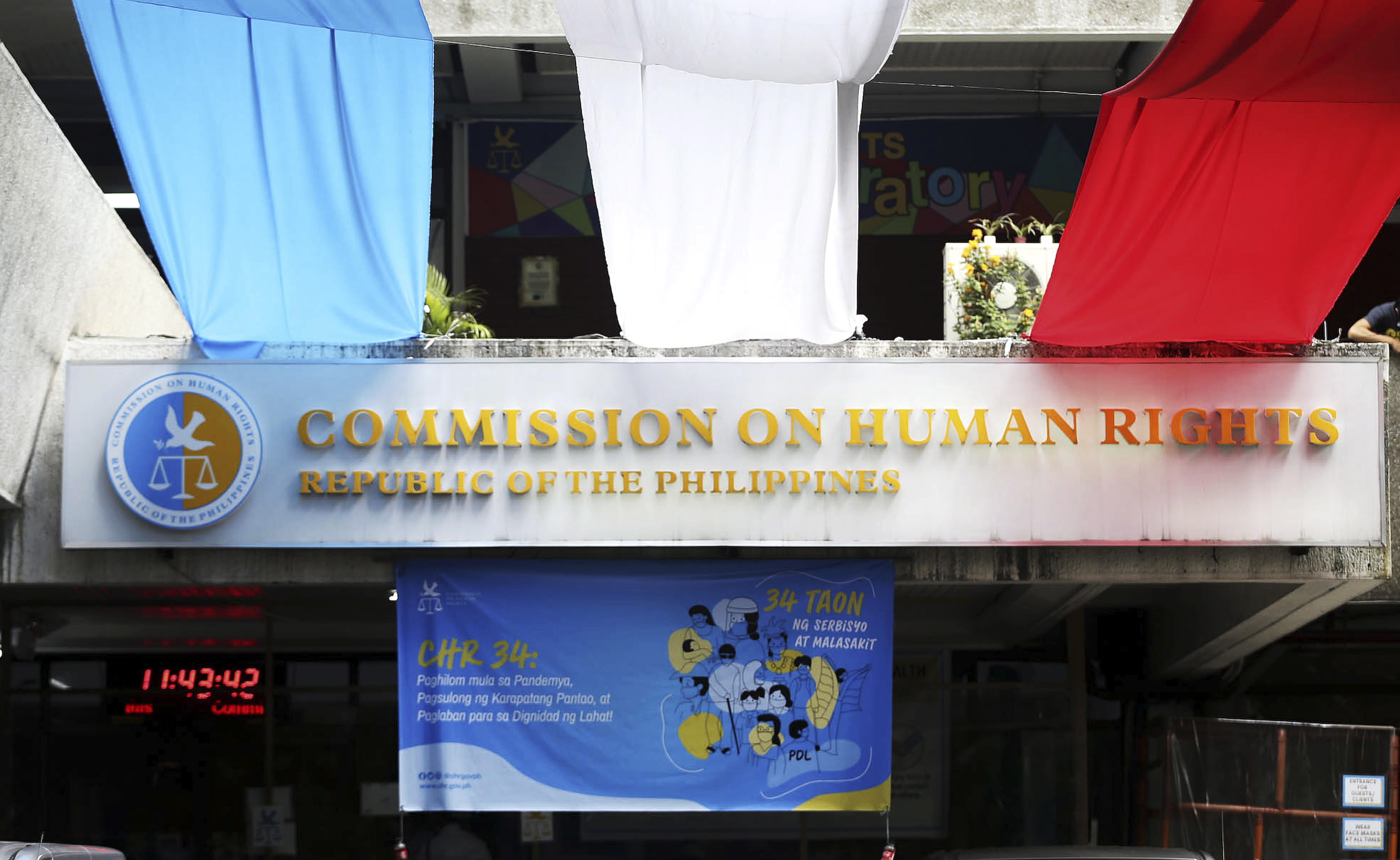CHR optimistic about state of human rights in PH in 2025

This photo taken on June 8, 2021, shows the facade of the Commission on Human Rights (CHR) office in Quezon City. INQUIRER / NIÑO JESUS ORBETA
MANILA, Philippines — The Commission on Human Rights (CHR) has expressed optimism about the state of human rights in the country in 2025 despite challenges experienced this year.
In a statement on Tuesday, December 31, CHR said that it would welcome the New Year with a positive outlook regarding “advancing the human rights landscape in the country.”
“The year 2024 has witnessed various challenges and developments in the human rights situation in the Philippines. As such, the Commission on Human Rights reaffirms its commitment to upholding its mandate to protect and promote the dignity of all as we welcome the new year,” the CHR said.
“We have all worked hard this year to advance and mainstream the human rights agenda across communities, with our ultimate focus on upholding the dignity of every Filipino. While we may have achieved much, there is no doubt that we still have an expansive responsibility ahead of us to continuously address the injustices that persist in our society,” it added.
The CHR urged the public to remember the importance of human rights.
“In the midst of our celebrations, let us not forget the essential principles that lie at the very core of our humanity—the principles of human rights. These inherent rights are the foundation upon which we build a just and equitable nation,” the CHR stressed.
“The Commission wishes everyone a year filled with greater opportunities to make a lasting impact on the cause of human rights and to further cultivate a sense of community that serves as a powerful symbol of our common humanity. Happy New Year to all,” it added.
Highs and lows in 2024
The human rights situation in the country has seen some highs and lows in 2024.
For example, last February 2024, United Nations (UN) Special Rapporteur Irene Khan acknowledged that the Marcos administration had done a better job in terms of human rights when compared to its predecessor — the regime of then-President Rodrigo Duterte.
However, Khan noted that the current administration still would have a lot to do, even if it had improved from its status when Duterte was still in charge. Khan said this was primarily because the Marcos administration had shown a willingness to cooperate with international bodies.
READ: Khan: Marcos admin ‘sets new tone’ on rights issues but still ‘not enough’
The government also earned praise after President Ferdinand Marcos Jr. issued Administrative Order (AO) No. 22, creating an interagency “super body” tasked to “enhance mechanisms for the promotion and protection of human rights in the Philippines.”
The special committee will be headed by the executive secretary and co-chaired by the secretary of the Department of Justice, with the heads of the Department of Foreign Affairs and the Department of the Interior and Local Government as members.
READ: Marcos forms special body on human rights
Calls to abolish the NTF-Elcac
Parties in the opposition are divided, however, in terms of A.O. No. 22, with former Sen. Leila de Lima saying that this was a correct move and showed the intention of the administration to prioritize the protection of Filipinos’ rights.
However, another ex-lawmaker, former Bayan Muna Rep. Carlos Zarate, believes there was nothing special about AO No. 22, stressing that Marcos could show his commitment to human rights by first abolishing the National Task Force to End Local Communist Armed Conflict (NTF-Elcac).
Zarate and other members of progressive groups have consistently been calling for NTF-Elcac’s abolition, especially after United Nations Special Rapporteur Irene Khan said that the task force must be stopped because the conditions for which it was created were already outdated.
READ: Opposition, allies split on Marcos’ special body for human rights
Then last September 2024, during the 2024 National Summit Against Online Sexual Abuse and Exploitation of Children, Marcos turned emotional after hearing a testimonial from a woman who was a victim of abuse when she was 13 years old. According to him, he felt a “deep sense of shame” over the continued occurrence of abuse against children.
But Marcos was urged by Gabriela party-list Rep. Arlene Brosas to “walk the talk,” noting that his emotional speech for abuse victims contradicted the small budget given to CHR — hampering the commission’s response against these crimes.
READ: Marcos told: You cry for victims of abuse, but CHR lacks funds
Brosas underscored the irony of Marcos asking the government to crack down on online sexual abuse while CHR was not given funds to fight these activities.